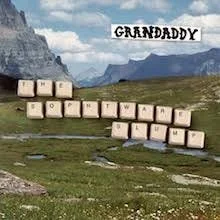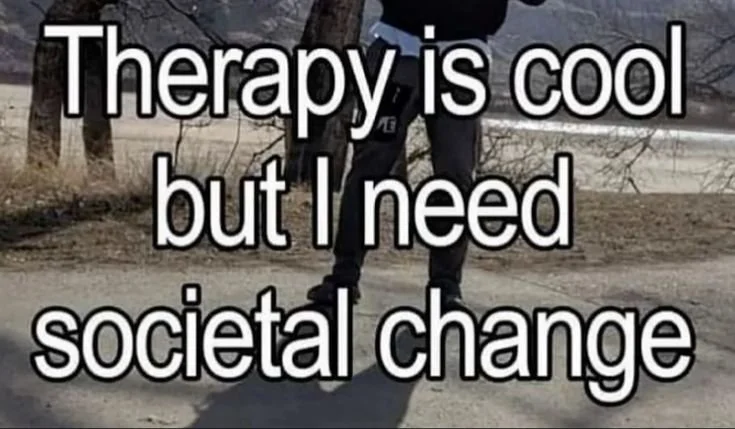The Art That Made The Art
the sophtware slump by grandaddyI saw a Tik Tok, admittedly, the other day of someone discussing why Radiohead’s ‘Let Down’ was listened to more this year than the year it came out. The creator noted how interesting it was that the generation listening to this song is the very generation that has lived their lives in the world that OK Computer warned us about. The creator also noted that in Tik Tok editing communities we can see that with the song’s renewed popularity has come a new interpretation. Originally, almost universally acknowledged as a harrowing song about the disappointment of life and considerations of suicide, the song seems to now have become an internet culture symbol of hope. So, this got me thinking about prophetic albums that could have an evolution of meaning in the era of their realization. Immediately, Grandaddy’s Sophtware Slump came to mind. This month has been a wonderful revisit of this album.
Released in the year 2000, this album feels both futuristic and deeply nostalgic. The song Broken Household Appliance, National Forest conjures specific moments from my childhood; playing in the creek in some obscure North Carolinian small town, accepting the great, hulking, metal creatures that decayed, as if they were a part of the landscape. And I think that encapsulates the subtle genius of the album that imbues it with enduring relevance. It is a technological commentary that manages to not be a condemnation nor an endorsement, but a nuanced examination of what already exists and what is coming. Listening to this album, feels, in of itself, like a decay. It is not affronting or self-important. It is raw and unusual, eliciting a slow grief for the natural world.
Parallel to this grief runs an examination of humanity through the character ‘Jed the Humanoid,’ also the title of the third song. Jed is a rough DIY project made by a group of friends to resemble a human. Throughout the third song, we follow Jed’s life in retrospect through the perspective of one of his makers, from his haphazard conception in the kitchen, to his eventual suicide. The key point in this song is that his creators only appreciate him for the degree to which he is able to imitate them: “Jed could run or walk, sing or talk and, // Compile thoughts and…” Eventually they become bored and move on to other projects, leaving Jed to fry his own system by drowning himself in alcohol: “He fizzled and popped…He rattled and knocked…And finally he just stopped.”
This song song could be interpreted as another exploration of the possibility of consciousness in artificial things like Data from Star Trek Next Generation or ‘The Lonely’ episode of the Twilight Zone. But, similarly to these other explorations in T.V., Jed the Humanoid is ultimately a mirror to the human condition, more obviously so, due to ‘Humanoid’ accompanying his title.
Android stories are, more often than not, Prometheus retellings. It is the story of a creator who develops affection for his creation which usually results in some tragedy or punishment. In this case, Jed is the distillation of the average late stage capitalist or techno-feudalist person. He encapsulates the dissatisfaction and disappointnment of entering this world and feeling abandoned by his creators. I like the idea that this is playing with the Christian notion of ‘God created man in his own image.’ Jed only receives the attention of his creators so long as he can entertain them through imitation. Even if not raised in a religious setting, a sense that we have disappointed something whether it be God, a parent, a friend etc. is a pervasive one in our time. Think of the shift from ‘Girl Boss’ to ‘girl failure’ content on the internet. We are witnessing a collective exhaustion from performing imitations of God to empty rooms.
In the reprise of this song ‘Jed’s Other Poem (Beautiful Ground)’ each previous point is reinforced. While ‘Jed the Humanoid’ explores Jed’s existence through the perspective of one of his creators, this song offers insight into Jed’s interior. It describes the bitter mundanity of a life that would be very relatable to the listener. From an “Air conditioned TV land, 20 grand // Walk to the bank,” to “High school wedding ring // Keys are under the mat,” Jed describes the bleak existence of our time thinly veiled by false promises made for advertising purposes. This song also re-contextualizes Jed’s suicide. Previously, we assumed that Jed’s reasoning was simply his abandonment by his creators. But in this song we realize that, while this is partially true, that the very expectation that anything would want to live or could function in our current world is an insanity in of itself. Jed is rational being in an irrational world.
This whole album continues to inspire me so deeply. The imagery is simple but so sharp and so real. It does what my favorite movies and shows did growing up, it offers a lens for truth through a character permanently exiled to see existence but never feel it. It also brings about the nature element of the discourse of our time in a way that OK Computer was missing for me. I love the tenderness and honesty with which this album approaches not just ourselves but our environment. I can only hope that the repetition of this album will let the imagery seep into my dreams and emerge, in some way, in my art.
Thanks for reading friends,
M



